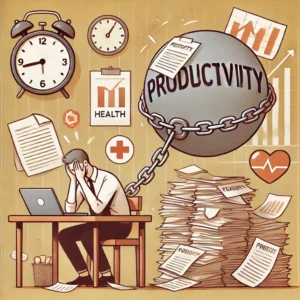You wouldn’t max out your credit card without a repayment plan.
Yet, every day, ambitious men and hardworking dads are quietly maxing out their energy, attention, and emotional reserves by taking on more than they can repay often without even realising it.
This invisible burden has a name: Productivity Debt.

It’s not just about being busy. It’s the silent accumulation of unfinished tasks, neglected health, strained relationships, and unrealised goals and a creeping liability that, if left unchecked, demands payment in the form of stress, burnout, and regret.
As a leadership and development coach who has worked with hundreds of men juggling careers, families, and personal dreams, I’ve seen firsthand the toll Productivity Debt can take. In this article, I’ll explore what Productivity Debt is, why it affects men and dads so acutely, and most importantly how you can spot it, manage it, and ultimately free yourself from it.
Because the truth is simple: Busy is inevitable. Debt is optional.
What is Productivity Debt?
Productivity Debt is a hidden backlog of obligations, unfinished commitments, and drained emotional reserves that silently accumulate over time.
Just like financial debt, it offers a short-term illusion of progress: “I’m handling it all!” , while quietly compounding in the background.
It’s different from simply being busy.
Busy is a full schedule. Productivity Debt is a burdened life.
When you’re simply busy, you feel stretched but in control.
When you’re carrying Productivity Debt, you feel anxious, reactive, and out of control, no matter how much you accomplish.
Busy, ambitious men and dads are particularly vulnerable.
Why? Because you’re often juggling multiple “infinite” games: work demands, family needs, social expectations, personal goals. There’s rarely a clean finish line.
The temptation to “just handle it” without pausing to think strategically is overwhelming. And every time you defer a tough decision, neglect a relationship, or sacrifice self-care in the name of ‘just getting through the week,’ you quietly take on another fragment of debt.
The bad news: Productivity Debt compounds fast. The good news: Awareness is the first step toward freedom.
How Productivity Debt Accumulates
Productivity Debt rarely feels like a single bad decision.
Instead, it’s the result of thousands of micro-choices over time:
- Saying yes to every meeting invitation.
- Skipping workouts because “work is just crazy right now.”
- Promising yourself you’ll spend more time with the kids “after this busy season.”
- Accepting constant interruptions without boundaries.
These small compromises feel harmless or often even virtuous at first.
After all, you’re getting things done, right?
But here’s the trap:
You cannot defer key parts of your life indefinitely without consequence.
Every day you prioritise urgent tasks over important ones; your health, your marriage, your dreams. You’re building a debt that future-you must eventually pay, often with interest.
And let’s not overlook emotional avoidance.
For many men, productivity becomes a shield against emotional discomfort.
It’s easier to grind through another project than to sit with the discomfort of marital tension, fatherhood guilt, or fear of failure.
The result?
A life that looks “successful” on the outside but feels hollow on the inside.
Real-world examples:
- Responding to client emails at your child’s school play.
- Missing another date night because of a “crucial” presentation.
- Promising yourself you’ll slow down… right after the next promotion.
Each small compromise builds the debt higher.
Good Debt Bad Debt. Getting your head around the types of debt we face.
The Hidden Costs of Productivity Debt
Productivity Debt doesn’t just cause stress.
It slowly dismantles the quality of your life from the inside out.
Chronic Stress and Burnout
When your nervous system is stuck in “urgent mode” for months or years, the physical toll is massive: high blood pressure, sleep disruption, weight gain, lowered immune function.
The very body you rely on to perform begins to betray you.
Deteriorating Relationships
Partners and children may not notice the first few missed dinners or distracted conversations. But over time, a chasm forms.
Resentment festers. Disconnection grows.
You might be physically present but emotionally absent (and they know it).
Diminishing Returns
Ironically, the more debt you carry, the less effective you become.
Creativity tanks. Decision-making falters.
You end up working harder and harder for diminishing results, wondering why nothing feels satisfying.
Regret and Resentment
Eventually, the debt is called in.
Maybe it’s a health scare.
Maybe it’s a marriage on the rocks.
Maybe it’s a midlife crisis fuelled by a sudden realisation: “I was so busy trying to win that I forgot what I was playing for.”
High performers who pride themselves on resilience are often the hardest hit. They outrun the symptoms for longer, but the crash is often harder.
Read more and learn about the concept of mental load for busy working Dads and how it might show up and impact you. Exploring the often-overlooked mental load that fathers carry, this piece emphasises the importance of self-care and setting boundaries to prevent burnout, complementing your points on emotional exhaustion and the hidden costs of over commitment.
How to Recognise the Warning Signs
The first step to paying down Productivity Debt is realising you’re in it.
Here are key symptoms:
Physical
- Persistent fatigue even after “rest.”
- Insomnia or restless sleep.
- Frequent illnesses or minor injuries.
Emotional
- Loss of joy or enthusiasm for things you once loved.
- Frequent irritability or anger outbursts.
- Feeling numb or disconnected from loved ones.
Behavioural
- Constant multitasking but little sense of completion.
- Growing disorganisation (missed deadlines, lost items).
- Cynical or defeatist attitudes (“What’s the point?”).
Quick Self-Check:
- Are you regularly breaking promises to yourself (e.g., exercise, hobbies)?
- Do you feel guilty even during “off” time?
- Is your patience with your family thinner than it should be?
- Are your achievements feeling increasingly hollow?
- Are you telling yourself, “After this next thing, I’ll get back on track”?
If you answered yes to three or more, Productivity Debt is likely present.
Strategies to Pay Down Productivity Debt
Productivity Debt won’t disappear by accident.
It requires intentional, courageous action.
Here’s how to start:
1. Debt Consolidation for Life
Apply the principle of essentialism: the disciplined pursuit of less, but better.
Ask:
- What are the few truly vital activities that move my life forward?
- What am I doing out of habit, fear, or obligation?
Cut ruthlessly.
2. Daily Minimums
Rather than massive “catch-up weekends” that never happen, set small daily non-negotiables:
- 20 minutes of undistracted family time.
- 10 minutes of reflection or journaling.
- A 30-minute walk outdoors.
Consistency beats intensity when paying down debt.
3. Energy Accounting
Track not just how you spend your time but where your energy leaks.
Ask each evening:
- What activities fuelled me?
- What drained me?
Adjust accordingly.
4. Saying No to Buy Back Your Yes
Develop polite but firm ways to decline:
- “I’m honoured you asked, but I can’t commit right now without compromising other priorities.”
- “That sounds exciting, but I have to pass to stay true to my current focus.”
Every ‘no’ buys you the right to say a deeply meaningful ‘yes.’
Read more about reclaiming some of the me time you once enjoyed. This blog highlights the necessity of personal time for overall well-being, resonating with your strategies on restoring one’s baseline and the significance of daily non-negotiables for mental health.
5. Restore Your Baseline
Your physical and mental energy are the foundation for everything else.
Prioritise:
- Sleep: 7–9 hours, non-negotiable.
- Movement: Daily, even if it’s just walking.
- Nutrition: Stable blood sugar = stable mood and focus.
- Mental stillness: At least 5 minutes a day of doing absolutely nothing.
No optimisation hacks will save you if your foundation is crumbling.
Conclusion: Choose Your Debt Wisely
Being busy is inevitable in seasons of life.
But drowning in Productivity Debt is not.
Every “yes” today is a silent “no” to something else.
Unchecked, that imbalance becomes a heavy burden tomorrow.
The good news?
You can choose to stop compounding debt starting now.
You can choose presence over pressure.
You can choose connection over chaos.
You can choose meaning over mere movement.
Because at the end of the day, it’s not about managing more tasks but it’s more about building a life that doesn’t need escaping from.
Busy is inevitable. Debt is optional. Choose wisely.
Make better decisions! Jump over to our insightful article supporting better decision making at home and at work . Addressing the cognitive strain of constant decision-making, this article offers techniques to streamline choices, which aligns with your advice on energy accounting and focusing on tasks that truly matter.
Understanding Productivity Debt
- Chris Williamson – “3 Minute Monday: Productivity Debt, Taboos & Anxiety“
Insightful newsletter article explaining the idea of productivity debt and anxiety. - Laura Stack – “Missing the Obvious: Three Common Types of Productivity Debt”
A breakdown of three key areas where productivity debt accumulates and practical tips to address them.
Practical Strategies for Busy Dads
- Brad Bartlett – “5 Productivity Tips for Busy Dads”
Easy-to-implement advice for busy dads who want to stay productive without losing connection at home. - Drew Soleyn – “Time Management for Dads: Prioritising What Matters and Finding Balance”
Focuses on managing competing priorities and maintaining life balance for fathers.
Mental Health and Burnout for Fathers
- Jason Runyon – “The Invisible Burden: Understanding the Stress of Fathers”
Addresses the unique mental health challenges that modern fathers face. - SAGE Journals – “Burned-out Fathers and Untold Stories: A Mixed Methods Investigation”
Academic research into burnout among fathers, causes, symptoms, and solutions.
Rethinking Productivity Culture
- Oliver Burkeman – “Why Time Management Is Ruining Our Lives”
(This article relates closely to why “hustle culture” and “constant productivity” are flawed ideas.)
Read here








